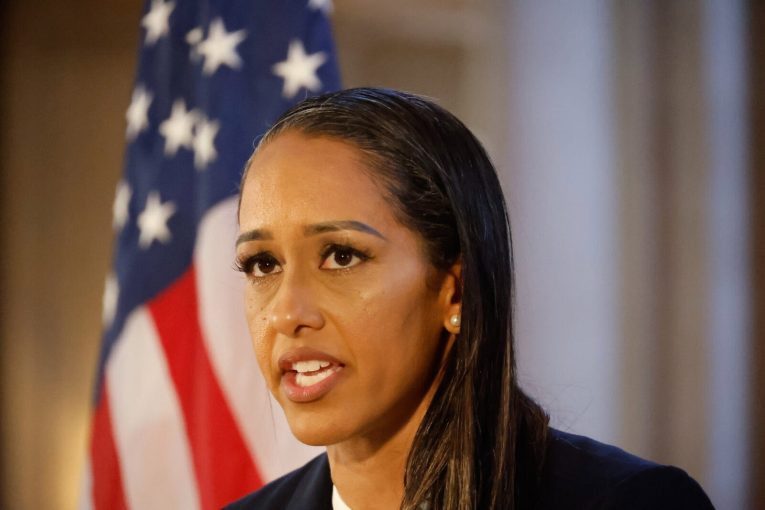

By David M. Greenwald
Executive Editor
San Francisco, CA – San Francisco DA Brooke Jenkins announced on Tuesday that her office will not file transfer petitions for juveniles, to try them as adults, in cases involving 16- and 17-year-olds, “unless they are accused of heinous crime(s) that shock the conscience of the community.”
According to her announcement, “Crimes that will be considered for review are listed in the Welfare and Institutions Code section 707(b) and are limited to murder, attempted murder, forcible sexual assault, kidnapping, torture, and aggravated mayhem, in addition, the offense must be heinous in nature.”
Further she announced, “Transfer hearing petitions will only be filed by the District Attorney after careful review by the managing attorney, Chief of Collaborative Justice, and a newly established Juvenile Review Team.”
“History has made it clear that juveniles of color have been disproportionately charged as adults in the American criminal justice system. This is something that we must correct by always presuming that our justice-involved youth should remain in the juvenile justice system where they have access to services like mental health and behavioral health support,” said District Attorney Brooke Jenkins.
She added, “I also recognize that as a DA’s office we must retain prosecutorial discretion to ensure that we protect the public and deliver justice in our most serious and egregious cases that is fair and proportional. Our new Juvenile Review Team will provide a holistic review of cases that will make the system fairer for all parties involved.”
Critics such as the Smart Justice Coalition worried that the policies “leaves room for the DA’s office to charge more kids as adults.”
They tweeted, “A prosecutor who is at all committed to both science and fairness must keep kids out of the adult system, because putting them into adult prisons all but guarantees they will lose the opportunity to get the care that kids need.”
John Hamasaki who is challenging the appointed DA in November, told the Vanguard in a text that he had not read her policy, “I’m generally following Gascón’s policy on juveniles… which allows for exceptional circumstances. Don’t have to use options, but safer to have them.”
In February this year, Gascón modified what had been a blanket ban on trying juveniles as adults.
The policy laid out by Jenkins notes, “Although California law allows for district attorneys to file fitness transfer motions as they see fit, District Attorney Jenkins’ Juvenile Review Team creates a more deliberative process that will yield fairer outcomes for juvenile defendants.”
They call this team “the first of its kind in San Francisco.”
In the past, prior to the passage of Proposition 57 in 2016, district attorneys could directly file transfer motions that disproportionately impacted young people of color and low-income youth, they noted, arguing that this policy limits that discretion.
Under this policy, “If the managing attorney of the Juvenile Unit makes an initial assessment that, despite the presumption of fitness, public safety concerns require a judicial review for the District Attorney to consider filing a petition for transfer, the managing attorney will consult with the Chief of Collaborative Justice who will consider the facts of the case.”
If the chief concurs, they would convene the Juvenile Review Team.
The managing attorney will consider the following factors in determining if public safety concerns are so great that a judicial review of the case is appropriate:
- the circumstances and gravity of the offense alleged to have been committed by the minor,
- the degree of criminal sophistication exhibited by the minor,
- whether the minor can be rehabilitated prior to the expiration of the juvenile court’s jurisdiction,
- the minor’s previous delinquent history, and the success or failure of previous attempts by the juvenile court to rehabilitate the minor (as defined in section 707).
According to the office, “The purpose of the Juvenile Review Team is to have individual cases thoroughly reviewed, with input from all parties involved, and provide District Attorney Jenkins with an informed recommendation.”
The Juvenile Review Team is composed of the Chief of Collaborative Justice, Chief of Victim Services and the Chief of Criminal Division – Specialized Crimes.
The Juvenile Review Team will “solicit input from the minor’s defense attorney to provide mitigating information or relevant evidence for consideration.”
The office noted, “The victim and/or the victim’s family and/or representative will also be informed of the review and asked to participate. The proceedings will be confidential and comply with all applicable rules regarding juveniles and juvenile proceedings.”
Upon completion of their work, the Juvenile Review Team will forward their opinion as well as any dissenting opinions on the fitness for a transfer hearing to District Attorney Jenkins.
“The Juvenile Review Team will provide all opinions to ensure that District Attorney Jenkins has insight into the proceedings and understands all points of view,” the policy explains.
The District Attorney will make the final decision regarding whether to file the fitness transfer petition to the court, who will rule based on the evidence presented.
“District Attorney Jenkins’ policy and approach is in alignment with the vast majority of progressive prosecutors in California and across the country,” the announcement states.

